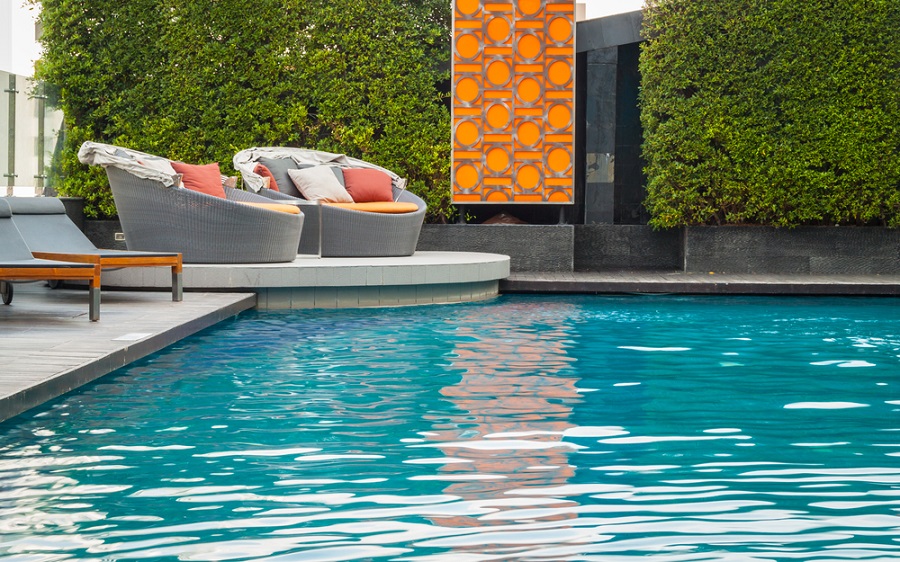A swimming pool is an investment that needs maintenance.
However, the cost of maintaining a pool will mostly depend on a few major choices you make upfront when you install it.
Once installed, the cost to maintain a pool is very predictable. The good news? It’s probably less than you think.
Here are some of the most common expenses associated with keeping a pool clean and safe.
Pool Maintenance Costs
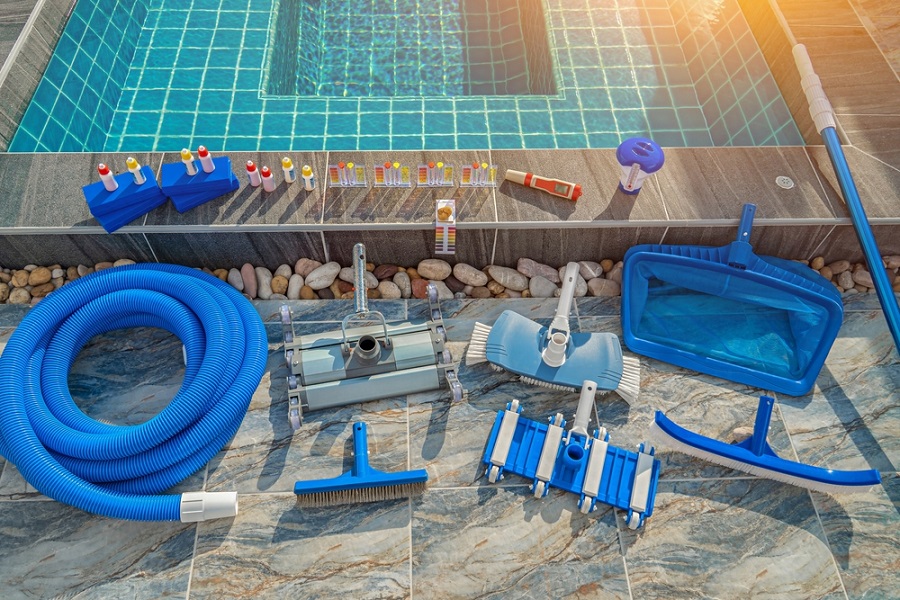
Swimming pools require regular maintenance because they contain many moving parts.
Swimming pools also need to be cleaned regularly to keep them looking their best.
There are two types of maintenance: routine and emergency. Routine maintenance includes everything that happens daily. Emergency maintenance occurs when something goes wrong with the pool.
Here are the items that need regular attention, replacement, and repair on all types of pools:
Pool Chemicals
A variety of chemicals are used to treat the water in the pool. They include chlorine, bromine, salt, algaecides, and bacteriacides.
Pool Filter
This removes debris from the water and helps prevent algae growth.
Pool Pump
Pumps circulate the water in the pool and push dirty (return) pool water through the pool filter to remove waste products.
Pool Skimmer
This is a device that sits near the surface of the pool and collects floating debris.
Cleaning Gear and Supplies
These are needed to clean the pool. Some examples include brushes, cleaning solutions, automatic pool cleaners, and scrub pads.
Pool Cover
This is a plastic or rubberized canvass sheet that covers the top of the pool. It keeps leaves and dirt out of the pool and keeps heat in overnight.
Pool Liner
This is a waterproof material that lines the bottom of the pool. The liner prevents leaks and protects the pool’s concrete or fiberglass walls.
Pool Heater
Heaters warm the water in the pool so people can swim without freezing.
Pool Lights
Lighting makes the pool safer at night.
Pool Furniture
Furniture adds beauty & social functionality to the pool area.
Pool Fence
This is a safety barrier between the pool and the rest of the yard. Required if you own kids or a pet.
Pool Gate
This is a door that allows access to the pool area. Required if you own kids or a pet.
Weekly Pool Maintenance Costs
The weekly costs for maintaining a pool range from $0-$50 per week. Weekly costs mostly consist of testing and adjusting pool chemicals, sweeping the pool’s surface and floors, and emptying filter baskets.
You’ll have to factor in whether you are doing this yourself, how often you use your pool, and how many people will be using it.
Monthly Pool Maintenance Costs

Monthly pool maintenance costs include utility and water fees plus monthly maintenance and repair work. All of these mostly depend on the type and size of your pool & whether you use a pool heater.
The owner of an unheated above-ground pool who does most of the work herself will only spend $25-$50 per month in-season to run the pump & pool cleaner, keep the filters clean, and buy and adjust chemicals as needed.
The owner of a large inground pool who outsources all of the materials and works to a pool service company will typically spend $200 or more per month for the same work.
Annual Pool Maintenance Costs

An annual inspection by a professional is also recommended. Annual inspections help ensure that your pool is working properly and that there aren’t any problems that need immediate attention. Cost ranges widely, but expect to pay $250 for a routine annual maintenance visit.
In addition, for pools older than 5 years, you should budget $250 to $1,000 for unplanned repairs and maintenance. This includes regular servicing, testing, and parts and labor for repairs.
If you don’t do proper preventative maintenance, you could end up paying thousands of dollars more than the above costs over the years.
Unplanned Pool Repair Costs
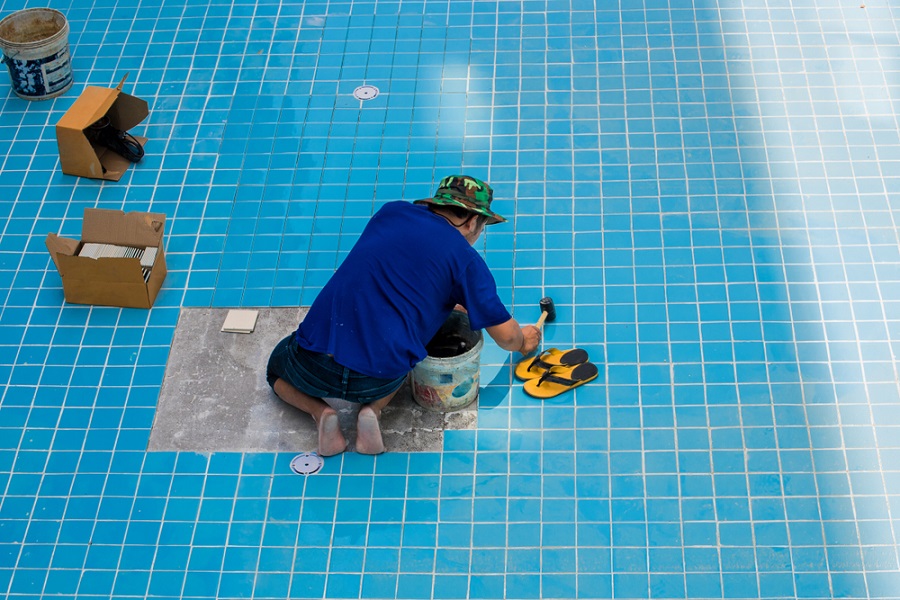
Most unplanned pool repairs fall into the following categories:
Leak Repair
If there is a leak in the pool, the liner will need fixing or replacing.
Structural Repair
If the concrete or structure holding your pool show signs of failing, then these need to be repaired before the pool suffers catastrophic damage.
Tile & Decorative Repairs
If tiles or decking around the pool is damaged, they must be replaced.
Pool Resurfacing
If the pool’s floor has sunk, then it may need to be resurfaced.
Pool Emptying and Re-filling
If the pool needs to be drained, for example, after a hurricane fills it with debris, then it must be drained, cleaned thoroughly, and refilled.
Benefits of Maintaining A Pool Properly

1. Keeps Your Pool Looking Great
Regular upkeep and maintenance keeps your pool looking great by keeping it free from mold, mildew, and bacteria. When you don’t take care of your pool, all sorts of problems can develop.
Mold grows quickly in damp areas, which leads to an unpleasant odor.
Mildew spreads easily through the air, making your home smell like a locker room.
Bacteria can cause skin rashes or even worse illnesses.
2. Prevent Far More Costly Repairs
Regular maintenance can help prevent really seemingly small problems such as leaks, cracked tile, and broken pumps from creating far more expensive problems such as structural replacement and even destruction of the pool.
In addition, having a well-maintained pool means less time spent fixing problems.
3. Makes Swimming Safe
Regular maintenance helps make swimming safe by preventing dangerous conditions such as algae growth. Algae can grow rapidly if your pool isn’t properly maintained. If left unchecked, algae will turn the water green and can damage your pool.
4. Improves Health
Keeping a pool clean and clear reduces the risk of drowning. Cleaning the pool also removes harmful chemicals and debris from the water. These chemicals and particles can irritate your eyes, nose, throat, lungs, and skin.
5. Increases Safety
Regular maintenance ensures that your pool is safe. The most common safety hazards include leaks, broken pipes, and cracked tiles. All of these issues could lead to serious injuries.
6. Reduces Effort, Stress & Labor
Maintaining a pool doesn’t just save money; it saves time too. Pool owners who perform routine maintenance spend less than those who ignore their pools. Regularly cleaning your pool also prevents costly repairs.
7. Saves Energy
If you want to reduce energy consumption, then you need to keep your pool water clean and your equipment running smoothly. Or consider having your pool professionally maintained.
Dirty pool water clogs pool filters, stressing your pump & costing more to push water through.
In addition, dirty heating elements and chlorinators lose their efficiency over time, leading to higher energy costs.
8. Protects Against Damage
When you neglect your pool, you’re putting your investment at risk. Over time, neglect causes cracks in tiles, walls, and liners. Cracks allow water to seep into the house, causing rot and mold.
How To Maintain A Pool To Keep Maintenance & Repair Costs Down
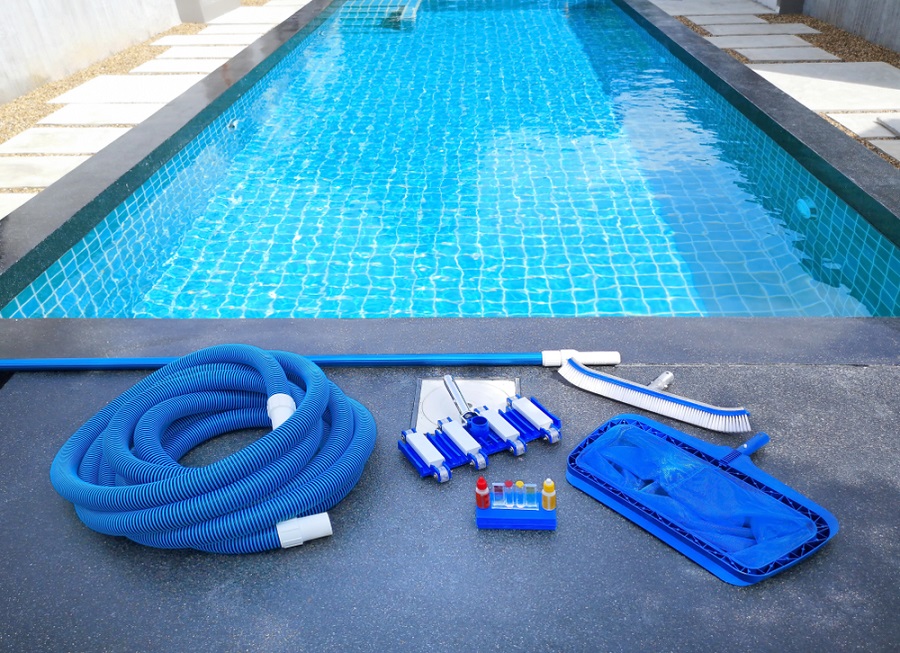
To ensure your pool stays healthy and looks its best, follow this guide for maintaining a pool.
1. Check the Water Level
The first step in maintaining a pool is checking the water level. You’ll need to do this every few days to know how much water is inside the pool. Don’t let it flow into your yard; don’t let it drop below your pool skimmer input, and you’ll be fine.
2. Test the pH
The pH balance of your pool is essential to maintaining a biological-free swimming pool. It’s important to test the pH balance once per month.
3. Change & Clean Your Filters On A Schedule
You should clean your pool filters about every three months and replace them every 3-5 years. Doing so will keep your pool clean and clear.
4. Keep Your Salt Topped Up
If you own a salt water pool system, make sure you keep your ppm levels within a healthy range, typically 2,500 to 3,500 ppm. Otherwise, your pool’s chlorine level will cause damage or let biology have its way with you.
5. Brush and Sweep Surfaces
Regularly brush the sides of your pool to remove and loosen algae and debris so your water filter can remove them. Use an automatic pool cleaner like a pool robot to clean the rest.
6. Keep Your Pool Deck Clean
Cleaning your pool deck regularly will keep it looking nice and keep more biologicals and debris out of your pool.
7. Keep Chemicals Out of Reach
Children have no idea what pool chemicals and do to them. Make sure you store all pool chemicals in a dry location out of the reach of children.
8. Keep Algae Blooms Under Control
In hot weather conditions, algae will forms on the surface of your pool whenever there’s an imbalance between the amount of oxygen in the air and the amount of oxygen dissolved in the water.
If this builds up, it can cause a number of health problems and eventually clog your filter. Chlorine will normally control algae, but if your water temperature gets high consider adding an algaecide.
9. Inspect Tiles
Tiles are one of the most vulnerable parts of a swimming pool. They can crack if they aren’t properly installed. And if they crack, they can create crevices that lead to further damage. Or form sharp edges that can injure. For this reason, it’s important to inspect them periodically.
10. Clean Walls
Walls are another part of a pool that needs regular attention. Make sure to clean all areas of the wall, including the liner, trimp line, skimmer, and lip.
11. Change Your Pool Filter
Your filter should be replaced every 3-5 years. The filter removes impurities from the water as well as collects leaves and other debris. When it gets clogged, it won’t work efficiently.
12. Repair Leaks Immediately
Leaks occur when something breaks or wears away. Repairs can range from replacing a seal to completely re-piping the system.
13. Replace Fencing
Fences around pools must be replaced every five years. Replacing fences helps prevent people from entering the pool without permission.
14. Install New Pumps When The Time Comes
Pumps are expensive, but they’re also necessary. Installing new pumps ensures that everything works correctly. Don’t try to rebuild your own.
15. Perform Regular Maintenance
Regular maintenance keeps your pool running smoothly. This includes cleaning the pool, testing the pH balance, and inspecting the filtration system.
16. Clean The Skimmers
Skimmers remove debris from the water before it enters the main drain. Keeping the skimmer clean prevents buildup and reduces the risk of blockages.
Major Factors That Affect The Cost Of Maintaining A Swimming Pool
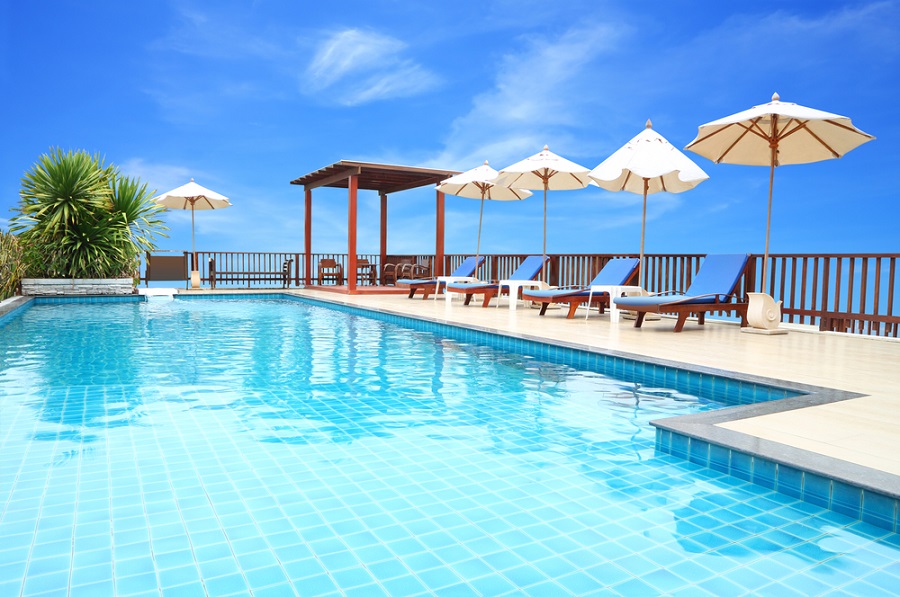
There are several factors that go into determining the price of keeping a pool clean and safe.
These include the size of the pool, the type of water used, the number of chemicals needed, and the frequency of cleaning.
Here are some tips to help you determine what it costs to maintain a pool.
Size of the Pool
The first thing to consider when determining how much it costs to maintain a swimming pool is the size of the pool itself.
Smaller pools usually cost less than larger ones. This is because smaller pools do not require as many chemicals and maintenance services.
However, small pools may not provide enough space for children to play safely.
In addition, small pools may not be big enough to swim laps.
On the other hand, larger pools often cost more money to maintain because they require more chemicals and frequent cleaning.
Water Quality
The quality of the water in a pool affects its overall upkeep.
For example, chlorine is an effective disinfectant that helps prevent bacteria growth.
Chlorine is added to the pool’s water every week. If the pool has a built-in filter system, then this should be done automatically.
If the pool uses saltwater instead of fresh water, then the pool owner must add sodium bromide to the pool water once a month. This prevents algae growth.
Chemicals
When determining how much it costs for a swimming pool to be maintained, you need to know how many chemicals are required.
Most pools use two types of chemicals:
• Chlorine – A chemical that kills germs and keeps the water clear.
• Algae inhibitor – A chemical that prevents algae from growing in the pool.
Both chemicals are added to the pool water weekly.
Frequency of Cleaning
The frequency of cleaning also plays a role in determining how much it costs a pool to be maintained.
Some pools require daily cleaning, whereas others require weekly cleaning.
Daily cleaning means that the pool needs to be cleaned twice a day.
Weekly cleaning means that the pool requires cleaning once a week.
It is important to note that weekly cleaning is more labor-intensive than daily cleaning.
Conclusion
Keeping a swimming pool clean and safe is very important.
However, it can be costly to maintain a pool.
Therefore, it is important to budget accordingly before purchasing a pool.
Once you have determined how much it costs to keep a swimming pool clean and healthy, you can plan accordingly.

